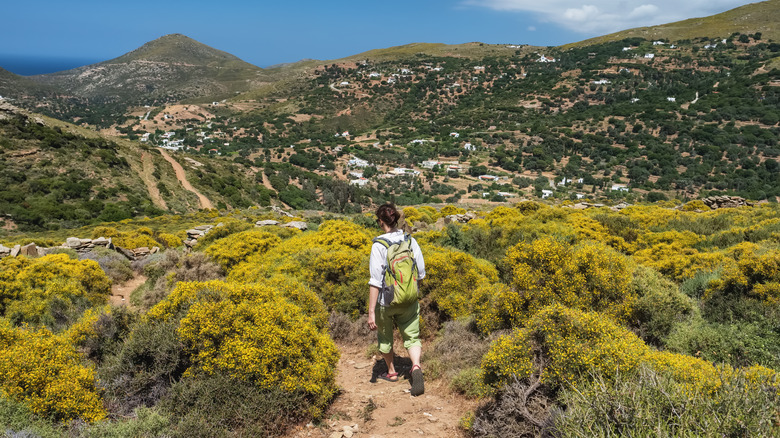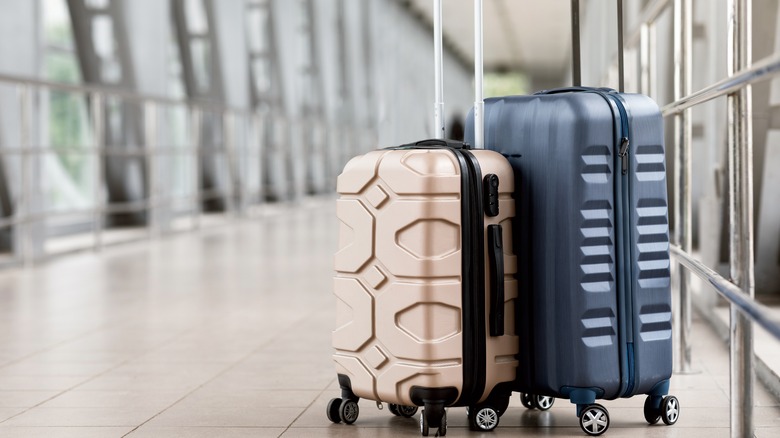Your Guide To Packing For Your Next Trip To Greece
Greece is a dream destination for many travelers. Sadly, the fantasy can quickly be ruined if you don't have a good idea of what to pack for a trip to the country. The planning and packing stages can easily turn into the worst parts of any trip — and unfortunately, even lovely Greece is no exception. There's a lot to consider, including what to bring in terms of outfits, methods of payment, and other things that might not initially come to mind.
You'll also want to take note of what time of year and where in the country you are traveling, as there's more to Greece than the endless summer Instagram pics most associate with the country. It is absolutely full of idyllic islands, remote beaches, delicious food, and friendly people, but there are many other aspects of it that you'll want to be prepared for.
Fortunately, your prep period doesn't need to be overwhelming. We've prepared the ultimate packing list for your next trip to Greece.
General things to keep in mind for a Greece trip
As a southern European country, Greece has a mild Mediterranean climate that won't require heavy packing, even in winter, per Climates to Travel. This is excellent news for those of us hoping to pack light, as no bulky winter jackets, snow boots, or layers will be necessary.
Even if you don't mind having a heavier bag, a smaller pack is preferable for travel in Greece. Expect that you'll need to carry your bag to and from multiple ferries, taxis, and buses (and often, up hills) to your accommodation. Keep that in mind when you debate whether or not to bring multiple pairs of shoes.
Additionally, remember to bring an EU plug converter for electronics and sun protection no matter the season. A good pair of comfortable walking shoes is also always advisable, as you'll be clocking in numerous miles each day, often on cobblestones or in hilly villages. Transportation in Greece can be late, indirect, and inconsistent (via Rough Guides). So even if you plan to simply relax and sun tan on the beach, it's smart to bring a book or e-reader for travel days.
Take note of the season
In general, Greece is warm and sunny, especially when compared to a lot of Europe throughout the year. However, you still need to factor in the varying weather and average temperatures with each season.
Greece is perhaps best known for its hot summers (June to August). But many fail to realize just how warm and humid those months can be. According to Seasons Year, the average summer temperature is between 70 and 90 degrees Fahrenheit. For some, the upper limit may be too much to even relax at the beach. In fact, many Greeks take a siesta and avoid going outside during peak sun times and temperatures. The humidity throughout the year, especially near the coast, can also catch people off-guard.
Fall can be a pleasant surprise, though September tends to be warm enough to enjoy a beach-and-island trip. The tourist (and beach) season lasts until October, especially as the climate turns warmer. Mornings and evenings will gradually get cooler, though, so pack layers. Winter is quite mild, but it can be rainy and overcast. Thus, don't expect to dive into the ocean between November and March. Still, the festive season is always a fun time in Europe, and Greece is no exception. Finally, per Greeka, spring is also a beautiful time of year to visit — flowers are in bloom, the mountain snow is melting, and the islands are not yet overcrowded.
How to dress for summer in Greece
Summer in Greece is hot and mostly dry, no matter where in the country you travel. (Although per Greece Travel Ideas, the north can see some rain in August.) It's also humid (as Greece tends to be), but surprisingly not as much as the other months, per Champion Traveler. The key to summer outfits in Greece is light and airy material that also covers and protects from the sun. Linen is a very popular material for breathability, as is cotton, according to the experts at W.H. Taylor Shirtmakers. If you plan to exercise, make sure you go in the early morning or evening, when the sun is at its weakest. Also, pack quick-dry material that won't leave you completely covered in sweat.
A Greek summer might be synonymous with lounging by the beach and working on your tan, but the sun can be quite strong and potentially damaging to your body. Thus, you should pack outfits that adequately protect your skin, like long linen pants, maxi dresses, or long skirts and flowy long-sleeved shirts. Of course, you don't need to be fully covered all the time, but protecting your skin while walking around town, eating at outdoor patios, and enjoying the wonders of nature in Greece is very important. Lastly, pack multiple swimsuits and cover-ups for the beach, as well as a sun hat, sunglasses, sandals, and water shoes (for rockier beaches).
What to pack for a fall trip to Greece
Fall is a lovely time to visit Greece. It stays warm through October in most places, but it's less crowded due to most people returning to work and school. Per Daves Travel Pages, the weather tends to stay at an ideal 70 to 80 degrees Fahrenheit during this season, considerably less intense than the summer months. Additionally, the slightly weaker autumn sun means you'll likely spend more time outdoors, as the risk of sunburn or heat exhaustion is lower. Also, the days remain at a reasonable length, at least until November. With that said, even in the "darker" months, areas such as Crete and Santorini can still be nice and sunny.
So, what kind of wardrobe will you need for fall in Greece? Basically, your summertime attire, but with a few amendments. If you're visiting from September to mid-October, then just pack a light sweater or jacket for the evenings and early mornings. If your trip isn't until mid-October or November, bring some waterproof clothes, as well as a few more sweaters and light scarves. Leave the swimming attire at home, and make sure you have other footwear besides sandals. And of course, sun protection in the form of glasses, a hat, and sunscreen should always be on your packing list.
The best outfits for a Greek winter
Winter in Greece is much warmer than in many other parts of Europe, but the season is certainly not tropical. The main feature of a Greek winter is variability. In general, December to February are dry and sunny, like most of the year, but average temperatures range between 50 and 60 degrees Fahrenheit, and clouds do make somewhat frequent appearances (per Greece Travel Ideas). Additionally, when it does rain, it's heavy, which isn't great in an outdoor-oriented society that enjoys a relatively mild climate year-round. Snow falls in the mountains, which can even reach lower-elevation destinations such as Athens (albeit rarely).
If you want to swim or enjoy any semblance of a beach vacation, winter probably isn't the best time for you to visit Greece. However, if you want to see a completely different side of the country (sans crowds) and enjoy bargain prices, this is the time to go! Just keep in mind that your suitcase will look drastically different from what you would pack during the other seasons. Layering is your friend: Bring long and short sleeves, jeans and other thick pants, scarves, hats, and a winter jacket (but nothing like what you'd need in Canada or Scandinavia during these months). Also, keep your tolerance for winter in mind. If you come from the tropics, bring your warmest clothes, but if you're used to proper winter, a Greek one might feel almost like summer!
How to plan for spring in Greece
Spring can still be on the chillier side, especially earlier in the season, but many days will feel warm by the afternoon. Temperatures fall between 46 degrees Fahrenheit in March and 77 degree Fahrenheit in May, per Seasons Year. As the days grow longer through April and May, flowers bloom throughout Greece, and temperatures slowly inch toward swimming weather.
Each month of the season brings slightly different weather and events, so plan according to your preferences. March can still be a bit brisk, but the sun is likely to shine brightly on most days, and the chance of snow or heavy rain remains low. April is when things really start to warm up, both in terms of temperature and activities. Depending on which part of Greece you visit and your tolerance for cold, you may be able to enjoy swimming towards the end of the month. Easter is a wonderful time to visit for the festivities (if crowded in most destinations due to Greeks returning home for the holiday).
May, however, is the real sweet spot, according to High Heels and a Backpack. Basically, it feels like summer, but with school and work still occupying many would-be vacationers, the crowds have not yet materialized. So skip the swimsuit from March to late April, and then later in the season, pack like you would for a summer vacation.
Dressing for cities versus the villages
As with most places in the world, the vibe differs a lot between big cities and small towns. Athens and Thessaloniki are much more cosmopolitan than villages on the islands or in the mountains. The climate also varies across Greece. The way people dress reflects this, and you should keep this in mind when planning an itinerary and packing your bag.
In general, you can dress in Athens and Thessaloniki as you would in other major cities throughout Europe. The weather is a bit different between the two, as Athens is known as the hottest capital city on the continent according to World Atlas. In contrast, Thessaloniki is located a bit more north and right on the sea. Unsurprisingly, it's generally warmer there than in Athens (via Budget Your Trip).
Where you need to be more cognizant of your wardrobe is in the villages and small towns. Of course, no one will bat an eye at you on the beach in a bathing suit. However, when you're strolling those white and blue-washed streets with sweeping views, it's best not to be in denim cut-offs and crop tops. Per Life Beyond Borders, bring an emergency shawl or scarf for coverage, and don't hang out topless in town. Also, if you're a woman who plans to go visit some monasteries, bring a skirt, as they're mandatory for women to enter.
Beach necessities
While this tends to be the main event for most tourists, a beach packing list for Greece wouldn't be so drastically different from what you'd expect to pack for other summer destinations.
Of course, you'll want to bring multiple bathing suits, as well as a pair of flip-flops or sandals. It's always smart to make sure these are comfortable to walk around in, as many of the best beaches require a bit of a hike or walk to reach. Alternatively, you can plan to wear sneakers or hiking boots and bring beach footwear in your bag. A towel is also often a good idea, as not every accommodation provides one, and not every beach has a place to change or chairs to rent.
Additionally, don't forget the sunblock, sunhat, and sunglasses — pretty much anything that will protect your skin when you're not in the water! It's also worth it to consider water shoes, as the Mediterranean coast can often be quite rocky. Put all of these in a good beach tote or backpack, as well as a reusable water bottle to ensure that you're adequately hydrated.
Mountain and hiking necessities
Greece may be best known as a beach destination, but its mountains (and hiking opportunities) should not be missed. Of course, if you want your trip (or even part of your trip) to become a nature adventure, you'll want to pack accordingly.
According to Hiking Rhodes, spring (particularly April and May) is the best time to hike in Greece. During these months, the weather hasn't turned too hot yet, but is still nice enough to not freeze. With that said, in some of the high mountains, June can still be an okay month for hiking. Fall also happens to be a beautiful time to hit the trails.
If you're going to hike in Greece, bring all the basics you would on any outdoor trip. Just like any season, bring layers (but make sure they're lightweight, as you'll warm up quickly in southern Europe). Don't forget your trainers or hiking boots, as regular running shoes won't last very long on the rocky Greek paths. Additionally, a good hat, plenty of sunblock, and loads of water are all a must. It's also a smart practice to always have cash and small change to buy snacks along the way or purchase supplies in small mountain villages where cards might be less frequently accepted.
Money in Greece
Like the rest of the Eurozone, the euro is the currency of Greece. (Fun fact: Until 2002, it was the drachma, per the Bank of Greece.) However, due to the economic crisis, the daily economy in Greece has been rather cash-heavy in recent years, as many Greeks prefer keeping their savings liquidated (via High Heels and a Backpack).
That does seem to be changing nowadays, though. As Athens by Locals notes, major cities are now largely cash-free. Still, for the rest of the country, you'll want to have cash on hand. You can purchase some from your bank at home, or wait until you arrive to withdraw from an ATM. Just make sure you've alerted your bank, so your card does not become blocked. And if you plan to use a credit card, request a PIN well in advance.
Also, make sure you try to break big bills as soon as possible. Greece is not an inherently expensive country and you most likely won't need them, but it can be difficult to spend notes over 20 euros. Shops and cafes don't want to break a 50 for a 5-euro purchase, so do so strategically when purchasing a large amount of groceries or paying for accommodation. Also, if an ATM gives you the option, always request smaller bills.
Miscellaneous things to pack for Greece
Once you've packed your wardrobe based on the area of Greece (and which season) you'll visit, it's time to make sure you haven't forgotten other must-have things.
For starters, a towel is always a nice addition to any bag destined for a Greek holiday. If you're staying in hostels or other less-than-luxurious accommodations, towels might cost extra, or may not even be provided. Additionally, a refillable water bottle and cup for hot drinks (to cut down on waste) are super useful if you have room. Furthermore, in addition to your luggage, a tote bag or backpack for daily use will certainly come in handy.
One important thing to note before you leave for Greece: according to Tapp Water, while tap water is safe to drink in most major areas of the country, the quality and taste may vary. The site notes that in big cities like Athens and Thessaloniki, you can generally drink water from the tap without worry. However, on the islands and in more rural parts of the country, drinking tap water may not be a very pleasant experience. Bottled water may also be out of the question, as it "may be unhealthier than tap water and definitely worse than filtered tap water." Thus, it's advised to use a water filter if you're worried about contamination, or if the taste of Greece's tap water bothers you.











